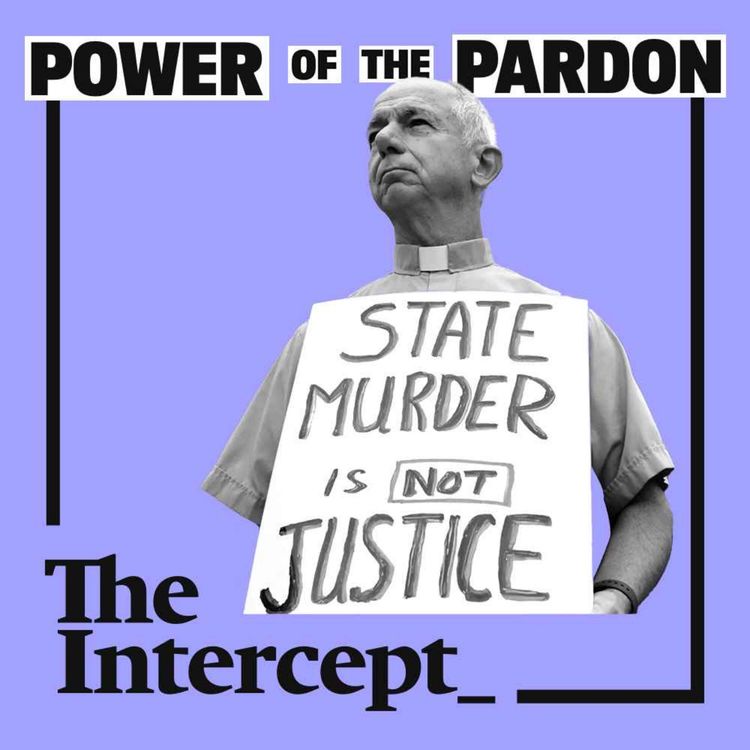Share

The Intercept Briefing
Power of the Pardon
Among a president’s most profound responsibilities is the power to grant clemency. Now, as President Joe Biden's first term winds down, he faces mounting calls to use that authority to commute the sentences of the 40 men on federal death row.
Donald Trump's final months in office marked a stark shift in federal execution policy. After a 17-year hiatus, his administration executed 13 people — the most under any president in over a century. While Biden halted this practice, advocates warn that a second Trump term could restart executions. It's why they're urging Biden to take decisive action now to reduce death penalty sentences to life without parole.
On this week's episode of The Intercept Briefing, reporter Liliana Segura examines the gap between candidate Biden's promises and his actions as president. “By far the most significant thing that Biden could do and should do in my opinion is to make good on his stated opposition to the death penalty, which is something he ran on in 2020. Joe Biden said that he wanted to try to bring legislation to end the federal death penalty and, in fact, incentivize states to do the same. He had language in his campaign platform talking about how life without parole sentences were appropriate alternatives,” she says.
According to Segura, the federal death penalty reaches far beyond the most notorious cases and its deterrent effect is questionable — challenging many Americans' assumptions. “This idea that the death penalty is a deterrent is like the myth that will not die. You know, I was in Indiana recently covering this midnight execution, and I'm looking at some of the rhetoric that is out there from the state attorney general, and he is banging that drum about, 'Oh, you know, this is a deterrent to crime.’ There's absolutely no evidence that that is true and there really never has been.”
To learn more about what Biden could do, listen to this week’s episode of The Intercept Briefing.
More episodes
View all episodes

7. Syria: What Comes Next?
38:50||Season 1, Ep. 7The unexpected toppling this weekend of the Assad regime by rebel forces brought a swift end to Syria's 13-year uprising-cum-civil war and over half a century of authoritarian rule. Syrians around the world have celebrated the development, with thousands walking free from the regime's hellish prisons. But in the aftermath, the situation remains volatile. Israel has struck targets inside Syria and moved troops deeper into the occupied Golan Heights, while international powers jockey for influence. Mohammed al-Bashir, who led the rebels’ de facto government in northwest Syria, has been named interim prime minister.Syrian journalist Rami Jarrah was among those celebrating Bashar al-Assad’s fall, but he’s worried about what happens in his country now. He reported from Syria during the early uprisings in 2011 and throughout the civil war, including Aleppo in 2016 during the intense bombardment. On this week’s episode of The Intercept Briefing, he says his own experience being detained and tortured by the Syrian government informs his concerns. “For a long time I had a serious grudge. I wanted revenge. Revenge that looked very ugly. And it’s why I understand how a situation like Syria, where there is this change of power, and how dangerous that can be because the things I was thinking about after what happened to me and what happened to loved ones of mine. I could not have been trusted to have authority in my hands if we’d gotten a hold of the perpetrators or even people that maybe just corresponded to the perpetrators. I don’t think I would have made sensible decisions. I think the last 4 or 5 years, I’ve been able to reflect,” he recounts.He says Assad and his family fleeing to Russia gives Syria a chance to move forward in a productive way. Had Assad stayed and fought, “we could have fallen into a civil war very quickly. … I think him fleeing sends a crippling message to those that supported him,” Jarrah says. “It made it much more likely that there could be a reconciliation process between those that supported Assad and those that were victims of Assad’s system.”To hear more of the conversation, listen to this week’s episode of The Intercept Briefing.
6. Silencing Dissent: Attacks on Free Speech and Nonprofits Are Already Ramping Up
27:10||Season 1, Ep. 6For years, Donald Trump has vowed to go after his critics and journalists. As he prepares to reenter the White House, he’s nominating loyalists, like incoming FBI director Kash Patel, who have pledged to do the same.The Trump administration may soon have a new weapon to target perceived enemies. On this week’s episode of The Intercept Briefing, we discuss the Stop Terror-Financing and Tax Penalties on American Hostages Act, or H.R. 9495.Last month, the House passed H.R. 9495, which would give the Treasury Department secretary the authority to label any nonprofit — like The Intercept — a terrorist-supporting organization and take away its tax-exempt status, likely forcing them to shut down.Noah Hurowitz, who has been covering the bill, says, “One thing that has come up a lot in my reporting on this, in talking to civil liberties experts and talking to nonprofits, is that the vagaries of the bill and the broad powers that it allows will likely have a chilling effect on free speech.”Shawn Musgrave, The Intercept’s senior counsel and correspondent, points out the legal implications: “One of the things that I think is important to think about for a bill like H.R. 9495, which is framed around terrorism, [it] really reduces the level of due process and takes a lot of the guardrails off of the current system.”Though it’s not likely that Senate Majority Leader Chuck Schumer, D-N.Y., will bring it up for a vote this session, the legislation could resurface in January when Republicans control both houses of Congress. To learn more about the implications, listen to this week’s episode of The Intercept Briefing.
5. The “Palestine Exception”
26:40||Season 1, Ep. 5Continued campus protests against the Gaza war have sparked heated debates around free speech, academic freedom, and the role of universities in addressing global issues. This spring saw an outpouring of students demanding that their institutions divest from Israel. Since then, universities have taken sometimes draconian measures to stop protests before they even begin.On this week’s episode of The Intercept Briefing, Intercept reporters Akela Lacy and Jonah Valdez, who have been following the protest movements for months, discuss the latest developments and how college administrators are responding. Lacy followed one such case at Case Western Reserve University in Cleveland, where students were hit with severe charges for vandalism. “The school is trying to make an example of student leaders in the movement for Palestine to chill further speech,” Lacy says. “I want to emphasize the fact that these are felony charges for undergraduate students for a nonviolent offense that is putting paint on a building.”Students and organizers who spoke with Valdez anticipate even greater hostility for protesters of every kind once Donald Trump takes office again in January. “This is what a lot of organizers were telling me leading up to Election Day was that there’s going to be so many other attacks on the rights of many other people," he says, "whether it’s reproductive rights, rights of trans people, LGBTQ community at large, rights of immigrants, all on top of the ongoing genocide and occupation of Palestine.”To hear more about the chilling effects on free speech and protest, listen to this week’s episode of The Intercept Briefing.The Intercept: "Class Struggle"The Intercept: "No Room for Emergency"The Intercept: "100 Days in Appalachia"
4. Rep. Summer Lee on the Fight of Our Lives
32:04||Season 1, Ep. 4As the clock winds down on the Biden presidency, Democrats have a limited window to act. Come January 20, Republicans will control the executive branch and both houses of Congress.On this week's episode of The Intercept Briefing, Rep. Summer Lee, D-Pa., acknowledges the need for swift action, particularly on the war in Gaza, prison pardons, and immigration. “I’ve been on calls with advocacy groups around immigration,” she says. President-elect Donald Trump's promises to conduct mass deportation are “an imminent threat.” One tactic she’s employing to drive home the urgency is bringing Dreamers and their stories to meetings. “The people closest to the pain should be closest to the power, closest to the policy solutions. That is not just a cute saying," Lee says. "It is, I would say, a very lifesaving way of thinking about the policies and the solutions that we have for the very real problems that we face. We can't keep icing out the people who live it.”But she is also planning beyond the next eight weeks and is determined to fight the Trump administration. “When you're playing, it's Friday night football, it's raining out, you should not leave that field and your jerseys white. You gotta get dirty,” she says. “Not a single voter wants to see us looking pristine when we're in the fight for our life right now.”To hear more about how Lee and her colleagues on the left are planning to handle the next four years, listen to this week’s episode of The Intercept Briefing.
3. Radical Action Under Trump
25:24||Season 1, Ep. 3In the wake of President-elect Donald Trump’s victory, Democrats and those on the left are grappling with what comes next.On The Intercept Briefing podcast this week, columnist Natasha Lennard critiques the Democratic Party. “You can’t be both at once: You can’t be the party of Wall Street, and you can’t be the party of the working class,” Lennard says. By acquiescing to Silicon Valley and Wall Street, the Democrats failed again “to offer a robust politics that serves the working class."Facing a second Trump term, Lennard says the way forward is a politics of everyday life and radical action that focuses on empowering grassroots movements and labor organizations. “When we look at what people can [do] — involving people at a local level, building community so that it is truly kind of a form of life to be in this politics, rather than just a donation, rather than just a vote, rather than just canvassing even.”In conversation with Jessica Washington and Jordan Uhl, Lennard emphasizes the importance and resilience of the working class. "Nurses unions, food workers unions. Most of the working class in this country are women. And it is a profoundly multi-racial working class. And we have a working class of care workers. And a service economy. And an increasingly growing care economy," she says. "That needs investing in. That needs support. That needs building."To hear more about the future of progressive politics, listen to this week's episode of The Intercept Briefing.
2. Kamala’s Fruitless Pursuit of the Mythical Moderate
30:45||Season 1, Ep. 2There will be much analysis and innumerable postmortems of what Kamala Harris and her campaign got wrong about the electorate this election.Already, the trends are becoming clear: She failed to reach Black and Latino men, who flocked to Donald Trump this cycle. She underperformed in cities, typically Democratic strongholds. And she even lagged among younger voters vital to her party’s present and future.What’s behind this dismal showing? One explanation is Harris’s inability to put forth a distinct agenda that would appeal to disaffected Democrats. Instead, she held steady to the policies of President Joe Biden, despite general voter dissatisfaction and anxiety about the economy and the direction of the country.“We see Democrats over and over turning to courting this mythical moderate voter,” says senior politics reporter Akela Lacy on this week’s episode of The Intercept Briefing. “We also see a big failure to account for the rightward shift among young people and figure out how to give young voters a reason to support the Democratic Party.”Listen to understand what Intercept reporters were hearing at the polls in Georgia and Pennsylvania this week.
1. How Does AIPAC Shape Washington? We Tracked Every Dollar.
23:26||Season 1, Ep. 1Welcome to The Intercept Briefing, a new podcast from our newsroom. In our first episode, politics reporters Jessica Washington and Akela Lacy break down The Intercept’s recent investigation on how the American Israel Public Affairs Committee has shaped U.S. foreign policy, as well as, as well as its record-breaking spending in the 2024 election cycle to unseat members of Congress who are who are insufficiently pro-Israel.
Understanding Israel’s “System of Domination”
42:09|The process of Jewish expansion over Palestinian land has involved maintaining a "system of domination," says author Nathan Thrall on this week's Intercepted. In order to constrict "Palestinians into tighter and tighter space" over the decades, Israel has deployed a strict permit system, movement restrictions, walls, fences, segregated roads, and punitive actions such as arrests and detentions, even of children.In “A Day in the Life of Abed Salama: Anatomy of a Jerusalem Tragedy," Thrall’s book, published just before the start of the current war, tells the story of one Palestinian man’s struggle to navigate Israel’s painful system of legal and security controls after his son’s school bus is involved in a fatal accident. Thrall joins host Murtaza Hussain in a discussion about the system of control that Israel maintains over Palestinians, violence in the West Bank, the future outlook for a negotiated solution to the conflict in Gaza, and possible escalation amid fighting at Israel’s northern border."A Day in the Life of Abed Salama" is a 2024 nonfiction Pulitzer Prize winner. Thrall is also the author of "The Only Language They Understand: Forcing Compromise in Israel and Palestine."If you’d like to support our work, go to theintercept.com/join, where your donation, no matter what the amount, makes a real difference.And if you haven’t already, please subscribe to the show so you can hear it every week. And please go and leave us a rating or a review — it helps people find the show. If you want to give us additional feedback, email us at Podcasts@theintercept.com.